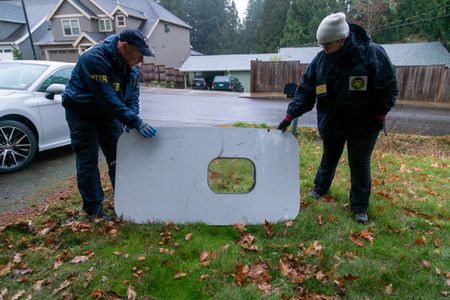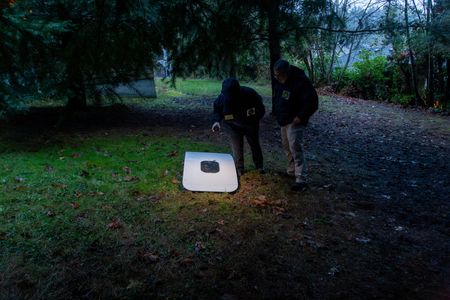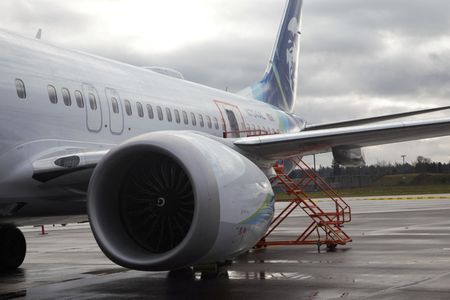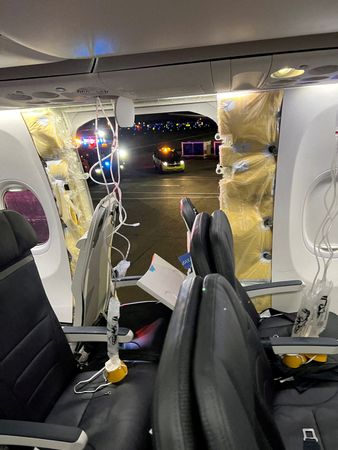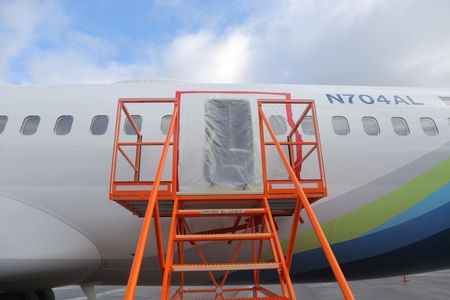By David Shepardson, Valerie Insinna and Tim Hepher
WASHINGTON (Reuters) -Boeing CEO Dave Calhoun acknowledged errors by the U.S. planemaker as more than 170 jets remained grounded for a fourth day, telling staff the company would ensure an accident like the mid-air Alaska Airlines panel blowout “can never happen again.”
The company’s top planemaking official, Stan Deal, also told a somber town hall meeting at its Renton, Washington 737 factory that Boeing acknowledges “the real seriousness of the accident” as it launches checks into its quality controls and processes.
Calhoun’s remarks were Boeing’s first public acknowledgment of errors since a so-called door plug snapped off the fuselage of a nearly full 737 MAX 9 on Friday, leaving a gaping hole next to a miraculously empty seat.
Calhoun said he had been “shaken to the bone” by the accident, which rekindled pressure on Boeing over its troubled small plane family almost five years after a full-blown MAX safety crisis sparked by deadly crashes in Indonesia and Ethiopia.
“We’re going to approach this, number one, acknowledging our mistake,” Calhoun told employees, according to an excerpt released by Boeing. “We’re going to approach it with 100% and complete transparency every step of the way.”
Alaska Airlines and United Airlines, the two U.S. carriers that use the temporarily grounded planes, have found loose parts on similar aircraft, raising fears such an incident could have happened again.
‘QUALITY CONTROL ISSUE’
In a separate meeting on Tuesday, Boeing told staff the findings were being treated as a “quality control issue” and checks were under way at Boeing and fuselage supplier Spirit Aerosystems, sources familiar with the matter said.
Boeing has sent written orders to its own plants and those of its suppliers to ensure such problems are addressed and to carry out broader checks of systems and processes, they said.
Boeing shares fell 1.4% on Tuesday as United canceled 225 daily flights, or 8% of its total, while Alaska Airlines canceled 109, or 18%. Similar cancellations were expected on Wednesday.
Calhoun also told Boeing employees the company would “ensure every next airplane that moves into the sky is in fact safe.”
He praised the Alaska Airlines crew that swiftly landed the plane, with only minor injuries to the 171 passengers and six crew.
Calhoun, who was a Boeing board member when all MAX jets were grounded in 2019, also praised Alaska Airlines for quickly grounding its 737 MAX 9 jets, adding he knew “how hard it is to ground planes, much less the fleet,” the sources said.
Some industry leaders have privately criticized Boeing for not grounding planes faster on Saturday. People familiar with the matter say it had been drawing up plans to order inspections when the Federal Aviation Administration (FAA) intervened with an emergency order to ground 171 planes.
Boeing voiced support for the FAA’s action, and the company’s contrite tone on Tuesday contrasted with statements that were criticized as legalistic after the 2018 crash of a Lion Air 737 MAX in Indonesia.
U.S.-based crisis communications expert Paul Oestreicher, who critiqued Boeing in 2019 for taking weeks to acknowledge its mistakes after the Lion Air and Ethiopian Airlines crashes, said this time Calhoun was “acting with much more speed, acknowledging the importance of transparency, expresses some empathy, and commits to a fix.”
Boeing declined to comment on Calhoun’s remarks beyond the official excerpt.
INSPECTION PROTOCOL
The panel that blew off Alaska Air Flight 1282 replaces an optional exit door on 737 MAX 9 planes used by airlines that have denser seating configurations.
Boeing has checked the service records of earlier Boeing 737-900ER aircraft that had a similar door plug, but all have undergone extensive maintenance since being delivered and none has shown a sign of similar problems, the sources said.
Airlines have not yet started official inspections of their grounded aircraft.
The FAA said Tuesday that Boeing was revising its instructions for inspections and maintenance, which the regulator must still approve before checks can begin. The FAA said it “will conduct a thorough review” and public safety will determine the timeline for returning the MAX to service.
Boeing ended 2023 in second place behind rival Airbus in aircraft deliveries for the fifth year running, after seeing its roughly 50% share of the market eroded by the earlier crisis, sources said.
The latest problems could prompt the FAA to take a harder line on certifying designs for other models, including required changes to the smaller MAX 7.
Boeing has sought an exemption to allow certification before the design changes that analysts say is much less likely now.
Two senior industry sources said they expected the plane awaited by Southwest Airlines to face another six-month delay.
FAA head Mike Whitaker, who took the job in October, will testify before Congress next month and could face questions about approval of the 737 MAX planes. The hearing was in the works before the incident on the Alaska Airlines flight.
(Reporting by David Shepardson and Valerie Insinna in Washington and Tim Hepher in Paris; Additional reporting by Lisa Barrington in Seoul, Joanna Plucinska in London, Allison Lampert in Montreal, Rajesh Kumar Singh in Chicago; Writing by David Gaffen and Tim Hepher; Editing by Matthew Lewis, Nick Zieminski and Jamie Freed)

